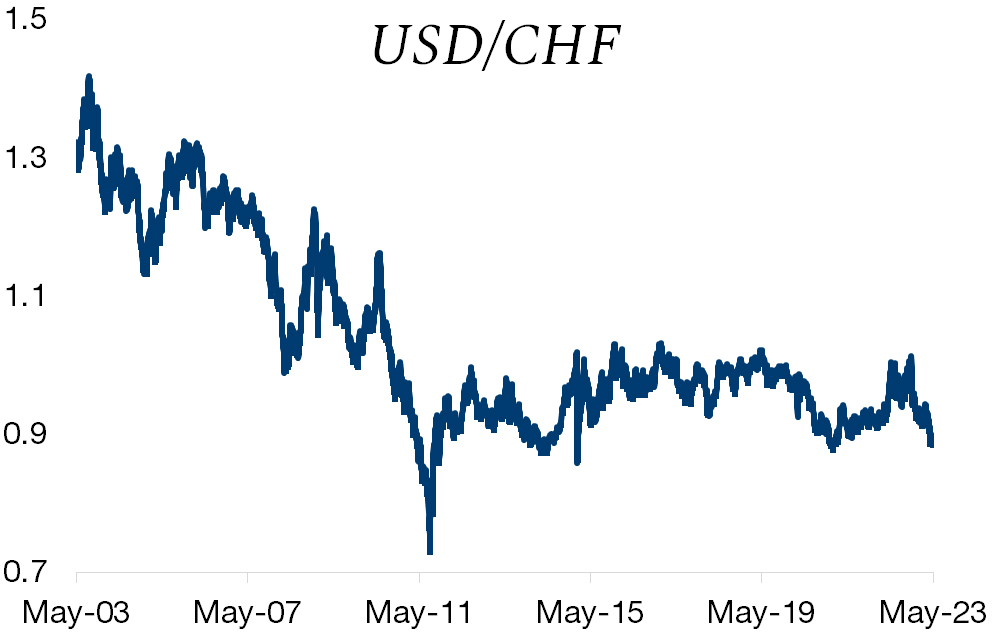08/05/2023
Flash boursier
Key data
| USD/CHF | EUR/CHF | SMI | EURO STOXX 50 | DAX 30 | CAC 40 | FTSE 100 | S&P 500 | NASDAQ | NIKKEI | MSCI Emerging Markets | |
| Latest | 0.89 | 0.98 | 11'554.24 | 4'340.43 | 15'961.02 | 7'432.93 | 7'778.38 | 4'136.25 | 12'235.41 | 28'949.88 | 981.66 |
| Trend | |||||||||||
| YTD | -3.67% | -0.86% | 7.69% | 14.41% | 14.63% | 14.82% | 4.38% | 7.73% | 16.90% | 10.94% | 2.64% |
(values from the Friday preceding publication)
Fed and ECB lift benchmark rates
Equity markets dipped last week as the US banking sector experienced another episode of volatility and in response to the looming threat of a US default if no agreement can be reached on the debt ceiling.
The Fed raised its benchmark interest rate by 25bp, from 5% to 5.25%. According to Chair Powell, it would be premature to say that the tightening cycle is over, but a pause in the process seems likely judging by the deterioration in economic conditions. This is despite inflation still being more than twice the medium-term target of 2%.
Meanwhile, the ECB raised its benchmark rate by 25bp on Thursday, which was smaller than previous hikes. The rate on the deposit facility now stands at 3.25%.
US economic activity remains brisk. After falling 1.1% in February, new orders in the manufacturing sector rose 0.9% in March, while manufacturing output fell a token 0.1% month-on-month.
Moreover, the services sector continued to expand in April, with the ISM services index rising in line with expectations to 51.9 from 51.2 in March. The new orders sub-index rose to 56.1 from 52.2 in the previous month. The employment component edged down to 50.8 from 51.3 in March.
On the labour market, the private sector added 296,000 jobs in April, smashing the 150,000 forecast. Separately, initial jobless claims rose by 13,000 to 242,000 last week. Nevertheless, the US economy added 253,000 non-farm jobs in April, well above the consensus estimate of 160,000. These data confirm the strong state of the US labour market and support the idea of a soft landing as expected by the current administration.
In Europe, economic growth accelerated in April. Strength in the services industry more than offset a slowdown in the manufacturing sector. The composite PMI reached its highest level in 11 months at 54.1, up from 53.7 in March.
In China, services activity was solid in April in response to the continued reopening of the economy. Markit’s IHS PMI came in at 56.4 last month, down from 57.8 in March,
The S&P 500 ended the week down 0.80%, while the tech-heavy Nasdaq was steady at +0.07%. The Stoxx 600 Europe Index was down 0.29% for the week.
Dollar losing momentum
The US dollar has been riding high on the back of its dominant position, but has recently entered a period of depreciation, exacerbated by global economic moves away from the currency.
Nevertheless, the dollar remains the benchmark for three reasons:
- US economic clout, which gives the dollar liquidity
- US military might, which makes the dollar a safe haven
- Its status as a reserve currency and the currency in which commodities are denominated.
Nevertheless, the dollar is losing momentum. And the main reason is the emergence of new economies that are undermining its hegemony. In effect, de-dollarisation is taking place as several governments turn their backs on the currency.
In the long term, the trend for the USD against the CHF is likely to be downward, and the prospect of the end of Fed tightening is likely to contribute to this weakness.



 Flash boursier
Flash boursier